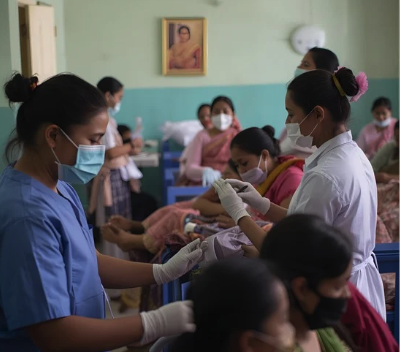
Summary
The effects of cancer extend far beyond physical health, touching every aspect of a person’s life. In Sri Lanka, 33,000 people were diagnosed with cancer in 2022 alone, facing fragmented health services, inefficiencies and limited access to holistic care. Addressing these systemic barriers is essential to improving treatment adherence, enhancing disease management, and ultimately raising the quality of life for those affected. Sri Lanka’s early efforts to move beyond purely medical interventions reflect a meaningful shift towards a people-centred approach to cancer care, aimed at improving both the efficiency and effectiveness of the health system.
Challenge
In 2022, nearly 19,000 people died of cancer in Sri Lanka, while just over 33,000 were diagnosed with the disease.1 2
People living with cancer in Sri Lanka often face disease-focused management styles, which do not adequately address holistic aspects of care.2 Combined with a lack of coordination between healthcare services, this can exacerbate barriers to accessing care, leading to treatment delays, poor health outcomes and a low quality of life.2
Despite an extensive public healthcare provision in Sri Lanka, the health system faces significant challenges, particularly around reimbursing preventive screening programmes.2 Screening for cancers such as breast and cervical cancer is often unaffordable privately and under-resourced in public healthcare settings, leading to inequities in access to early diagnosis, especially among people on low incomes.2
Efficiency in cancer care looks beyond cost reduction alone. It involves making the most effective use of available resources – including human, financial, infrastructure and technological assets – to achieve optimal health outcomes.3
Solution
A shift towards people-centred care is an important step towards enhancing efficiency of cancer services. This approach recognises that high-quality care goes beyond treating the disease itself: it must also account for the experiences, preferences and circumstances of people living with cancer and, when appropriate, must involve their loved ones in care decisions.4 Doing so can strengthen trust, support shared decision-making, promote more equitable outcomes and ultimately improve population health.4
To help address current gaps in the health system and cancer care, the Sri Lanka Cancer Society promotes a people-centred approach, providing:2
- palliative care to help manage pain and discomfort
- financial contributions towards costs associated with treatment and care
- assistance with transport and accommodation for people travelling long distances to access treatment
- reintegration support to help people living beyond cancer return to work.
Through these services, the Sri Lanka Cancer Society considers more than the medical needs of people living with cancer. They also focus on the emotional, practical, financial and social barriers and pressures that often prevent people from completing or benefiting fully from their cancer treatment.2
Next steps
To fully integrate people-centred cancer care into health systems, action at the national level is crucial.2 In Sri Lanka, cancer care is being integrated within broader non-communicable disease (NCD) programmes to ensure that essential services such as screening and treatment remain accessible to the entire population.2 Cancer early detection centres which operate under the national cancer control programme and part of the Non-Communicable Disease Bureau, offer free consultations, information on risk factors and screening for breast, cervical and oral cancers.2 These efforts illustrate how aligning cancer care with broader public health strategies can extend reach, reduce inequalities and ensure resources are used more effectively.
Sri Lanka’s early progress in expanding cancer care beyond medical interventions reflects a meaningful shift towards people-centred care.2 Moving forward, these approaches should be embedded into national cancer control plans (NCCPs).
NCCPs provide essential frameworks for strengthening health systems by setting clear priorities, coordinating resources and supporting equitable access to care.2 For NCCPs to be effective, they must be informed by the lived experiences of people with cancer, so that key barriers to care are accurately identified and addressed. National-level advocacy is also needed to secure funding for implementation.2
Efforts to integrate cancer services into broader NCD programmes represent an important step towards greater equity. To be fully effective, however, these strategies must also consider wider determinants of health – such as poverty, education and geographical location – that influence cancer risk and outcomes.2 This means investing in community-based support systems, ensuring sustainable financing for preventive and diagnostic services, and involving people with lived experience in the design and delivery of care.2 Through these measures, the health system and cancer care services in Sri Lanka can move closer to providing more efficient, inclusive and person-centred care for everyone.
References:
- World Health Organization. 2024. Global Cancer Observatory - Sri Lanka. Available here: https://gco.iarc.who.int/media/globocan/factsheets/populations/144-sri-lanka-fact-sheet.pdf [accessed: September 2025]
- Union for International Cancer Control. 2025. Transforming fractured health systems: prioritising people-centred cancer care. Available here: https://www.uicc.org/news-and-updates/news/25-m4-transforming-fractured-health-systems-prioritising-people-centred-cancer-care [accessed: August 2025]
- All.Can’s definition of efficient cancer care. Available here: https://www.all-can.org/all-cans-definition-of-efficient-cancer-care/ [accessed: August 2025]
- United by Unique. 2025. What is people-centred care? Available here: https://www.worldcancerday.org/the-campaign/what-people-centred-care [accessed: August 2025]